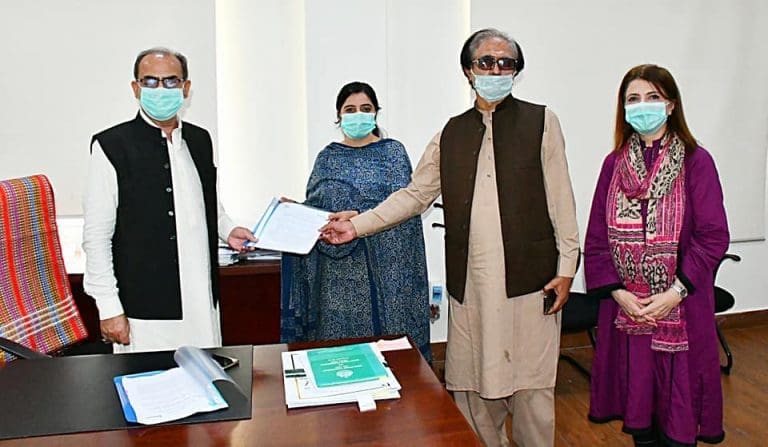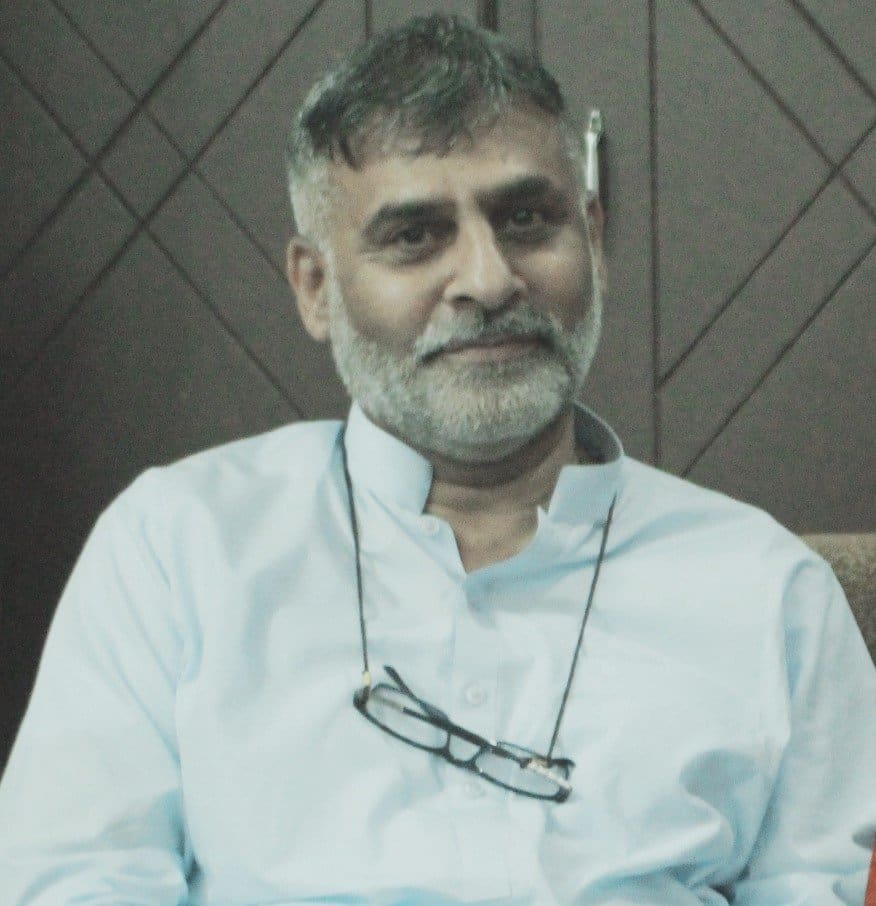
Signing the letter of understanding between WaterAid and the Secretary of the Education and Literacy Department of Sindh Province, in Karachi, Pakistan (WaterAid Pakistan). Pictured left to right: Ahmad Bakhsh Narejo (Secretary, Education and Literacy Department), Ms. Raheema Panhwar (Sindh Provincial Coordinator, WaterAid Pakistan), Mir Muhammed (Project Manager SusWASH, WaterAid Pakistan), Dr. Fauzia Khan (Chief Advisor Curriculum Wing, School Education and Literacy Department)
Background: WaterAid has been working in Pakistan since 2008, focusing on the improvement of sanitation coverage in urban and rural areas. They work in three districts across three provinces, helping to coordinate governmental and civil society efforts, and using local media as a tool to elevate the profile of WASH. WaterAid sees sanitation coverage as a top priority across Pakistan, supported by their SusWASH initiative. Below is a summary of an interview with WaterAid Pakistan’s Programme Manager.
To find out more about WaterAid’s WASH system strengthening work, read their latest global learning report, featuring case study examples from Cambodia, Ethiopia, Pakistan, and Uganda.
Alec Shannon (AS), Content Strategist, Agenda for Change: Tell me about the history of WASH services in Pakistan. How is your work different now than 5 years ago?
Sohail Nazir (SN), Programme Manager, WaterAid Pakistan: As a country program, most of our activities are focused on sanitation. From 2008 until 2012 our focus was on small projects and interventions for urban sanitation. When we started work in Pakistan, the overall sanitation coverage was very low compared to water coverage among communities. The situation in rural areas was even worse. We promoted a component sharing approach where the government funded the main sewers and sewerage lines, and the communities funded the construction of household latrines and internal sewage systems. In 2012, we shifted our approach to rural areas, to focus on meeting the Millennium Development Goals. When we started, the sanitation coverage was quite low and remains low today. We conducted a small study last year. Based on the results, you cannot claim that sanitation is safely managed in Pakistan. Also, there is a lot of rapid urbanization within the country: in urban areas, it is congested, and there are still sanitation issues. So, there is more work to be done. However, through our extensive work following a district-wide approach, we were able to achieve the first district-wide open defecation free status in Pakistan for Muzaffargarh in 2019.
AS: What parts of the WASH system are you strengthening (e.g., which building blocks)?
SN: The foremost building block is strategic planning. We work with the government on WASH asset mapping and gap analysis, help them identify the gaps, and strengthen their planning processes. Regarding accountability and regulation, we work with parliamentarians who influence policy changes. Similarly, we are working with media fellows to highlight WASH coverage gaps to wider audiences including policy makers. We also work with the provincial education departments on strengthening their monitoring system, such as refining their WASH in schools monitoring indicators. We are working on service delivery and behavior change as well, by developing replicable models for achieving open-defecation free status, female-friendly toilets, and supporting the government on hygiene behavior change activities. We have completed a context analysis for Sindh [pictured below] where all the nine building blocks have been ranked.

A context analysis of WASH systems building blocks, created for the Sindh Province by WaterAid Pakistan.
AS: How are you working with the government (national and/or local)?
SN: We work closely with district governments and the public health engineering department. There is a government-formed District Coordination Committee, which is comprised of members from government departments and some civil society representation. The District Coordination Committee serves as a coordination forum and supports WaterAid in being part of government planning and resourcing. However, the focus of our system strengthening work is at the provincial level, because no matter how much you work at the district level, unless it is linked with the province, it will not bring any change. As such, we are working very closely with the education department at the provincial level and we have signed a letter of understanding to work on WASH indicators in schools. After integration of these indicators, the next step was collection of data – which has been completed in the entire Sindh province. We also work with a group of parliamentarians to change policy – we mobilize them to table movements in the assembly, we provide them with facts and figures, and show how the WASH system is functioning within their province. Separately, we participate in a technical working group on WASH in schools at the provincial level, which is where we drafted the monitoring indicators. Though this group, we are supporting the education department in promoting menstrual hygiene management through construction of girl-friendly toilets, formation and training of menstrual hygiene management and WASH clubs, and training government teachers as menstrual hygiene management and WASH master trainers. We have also worked extensively with government in integrating WASH messaging into the curriculum for grades 1 through 6. This new curriculum has been approved by the federal government for roll-out at the provincial level.
AS: Are you working with other civil society or private sector actors to strengthen systems?
SN: This district forum that I spoke of includes local community-based organizations, local non-governmental organizations, and government organizations. We trained members of these organizations in our behavior change and community mobilization processes. At the provincial level, there is an informal support network, like a WASH Cluster, comprised of members who mostly coordinate their activities during floods and other emergencies. WaterAid also regularly interacts with organizations like Oxfam, UNICEF, and International Rescue Committee. There are many other international non-governmental organizations that come together at different coordination forums, but there is not an established forum.
AS: What are your next steps?
SN: It was clear when we started the SusWASH Programme in 2017 that systems strengthening is an approach that will require us to invest a lot of time. We are now three years in, and making great progress, but there is more work ahead. In the program extension phase (2020 – 2022), we are focusing on streamlining the WASH in schools monitoring system. We will also help the government with WASH planning and implementation, and we have started developing a community-managed model to help the rural communities where there is little government regulation or funding. In this model, government would take some level of responsibility to conduct monitoring and repairs of rural water supplies.

Sohail Nazir is Programme Manager for WaterAid Pakistan. He has a degree in Mechanical Engineering and a Certificate in Project Management for Professionals. He has been working in the WASH sector for the past 20 years, including 8 years in emergency response at national and international levels, and with WaterAid for the past 12 years. He has been a lead in designing and delivering WaterAid Pakistan’s district-wide programme in Muzaffargarh district, which was declared the first-ever open defecation free district of Pakistan in November 2019.
